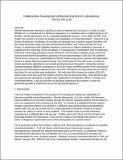Collaborative development of remote electronics laboratories in the ELVIS ilab
Author(s)
Jiwaji, Adnaan; Hardison, James; Ayodele, Kayode; Stevens Tickodri-Togboa, Sandy; Mwambela, Alfred; Harward, V. Judson; del Alamo, Jesus A.; Harrison, Bryant; Gikandi, Samuel; ... Show more Show less
DownloadiLab_ASEE_paper_v8-final.pdf (554.1Kb)
OPEN_ACCESS_POLICY
Open Access Policy
Creative Commons Attribution-Noncommercial-Share Alike
Terms of use
Metadata
Show full item recordAbstract
Remote laboratories represent a significant value to engineering curricula in a variety of cases.
Whether it is a complement to a hands-on experience or a substitute when a traditional lab is not
feasible, remote laboratories can be a valuable educational resource. Since 1998, the MIT iLab
Project has worked to increase the quality and availability of remote laboratories. Using the iLab
Shared Architecture, developers of new labs can leverage a set of generic support functions and
then share those labs easily and with minimal administrative cost. More recently, the iLab
Project, in partnership with Obafemi Awolowo University in Nigeria, Makerere University in
Uganda and the University of Dar-es-Salaam in Tanzania and in coordination with the Maricopa
Advanced Technology Education Center (MATEC), has focused on building iLabs around the
National Instruments Educational Laboratory Virtual Instrumentation Suite (ELVIS) platform.
The ELVIS is a low-cost, small-footprint unit that contains most of the common test instruments
found in a typical electrical engineering lab. By coupling the ELVIS with iLabs, a variety of
remote electronics laboratories can be built and shared around the world. Using this common
hardware/software platform, participants in the iLab Project at different levels of the educational
spectrum have developed experiments that meet their individual curricular needs and are able to
host them for use by other peer institutions. Not only does this increase the variety of ELVISbased
iLabs, but it also spurs the creation of teams that can then build other, more diverse iLabs
and substantively participate in project-wide collaborative development efforts. Through such
coordinated efforts, iLabs can provide rich practical experiences for students
Date issued
2009-06Department
Massachusetts Institute of Technology. Department of Electrical Engineering and Computer ScienceJournal
2009 ASEE Annual Conference & Exposition
Publisher
American Society for Engineering Education
Citation
Jiwaji, A., J. Hardison, K. P. Ayodele, S. Stevens, A, Mwanbela, V. J. Harward, J. A. del Alamo, B. Harrison, and S. Gikandi, "Collaborative Development of Remote Electronics Laboratories: The ELVIS iLab." 2009 ASEE Annual Conference & Exposition., Austin, TX, June 14-17, 2009.
Version: Author's final manuscript